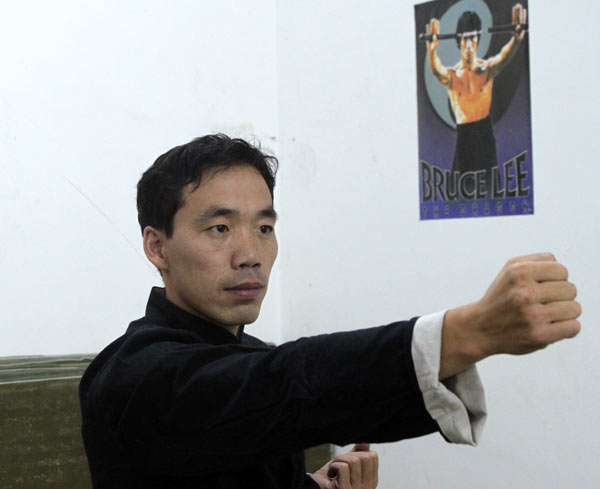Profiles
Punching it up, kungfu style
By Cao Yin and Qiu Bo (China Daily)
Updated: 2010-09-07 08:38
 |
Large Medium Small |
Beijing - Becoming another Bruce Lee has been a childhood dream for many generations in China. Yet with the increasing popularity of video games, many children only focused on mastering the joystick.
Now, with the success of two recent movies featuring Lee's former teacher, Yip Man, and his Wing Chun style of kungfu, a passion for learning the art is becoming fashionable again.
|
 Wang Desheng, a kungfu master, practices Wing Chun at his martial arts gym in Beijing on Sept 3. [Liu Zhe / for China Daily] |
"I see this as a great opportunity to promote the Chinese traditional martial art of Wing Chun," said Wang Desheng, a 34-year-old martial artist, who has been looking forward to this moment since childhood.
| ||||
Wing Chun is the type of Shaolin kungfu featuring fast moving fists on which Lee developed his own style of kungfu: Jeet Kune Do, the Way of the Intercepting Fist.
"I have to say, the series of Ip Man films have brought many opportunities for my Wing Chun schools. Before that, I had only a few dozen students," Wang said.
Wang now has at least 400 disciples and is keen to build more kungfu schools.
In Wang's schools, participants range from 7 to 47 years of age, from office workers to school children.
"There are more people paying attention to our traditional kungfu, but it's not enough," Wang said.
Wang believes far more Westerners than Chinese now study Wing Chun.
"It is a precious heritage left by our ancestors, which needs our contribution and development," Wang said.
Born and raised in Northeast China's Jilin Province, Wang has been interested in Chinese kungfu films, especially those featuring Bruce Lee, for as long as he can remember.
"I had always wished one day I would become a kungfu master and run a school teaching others," Wang said.
In pursuit of his dream, Wang left home for Beijing at the age of 13. After working as a security guard for a few years, he finally got the chance to learn and practice martial arts professionally.
Wang remembered one day he saw a poster with Bruce Lee advertising a martial arts class at Beijing Jiaotong University.
He signed up immediately.
"I learned quickly, which gave me a chance to perform at universities," he said proudly.
A few years later, Wang was even able to establish his own kungfu school in Beijing.
But very few people came to learn Wing Chun in the first few years.
"It seemed people nowadays are not as enthusiastic about Chinese kungfu as we were in our time," he said. "But I've always loved Chinese kungfu, especially Wing Chun. To some extent, practicing Wing Chun has changed my personality and life."
Wang said he was once very short-tempered, but practicing Wing Chun has transformed him into a calm person.
"Although Wing Chun involves fast moving fists, it requires the practitioner to be calm enough to really master it," Wang said.
Despite slow business, Wang continued practicing Wing Chun.
In 2007, he went alone to Hong Kong to seek an apprenticeship with Yip Chun, the late Yip Man's son.
"He (Yip Chun) is already in his 80s, but he is the embodiment of a kungfu master," Wang said. "He is kind and modest and willing to offer whatever he can to help others when it comes to learning kungfu."
As a result of Wang's sincerity, Yip accepted Wang as a formal apprentice and imparted all his skills to him. He also gave Wang a tablet inscribed with the words "Wing Chun Successor" as a gift.
Being Yip Chun's apprentice has made Wang popular in Beijing.
"I also plan to run a franchised gym across China where Wing Chun is taught," Wang said. His plans include launching tournament courses in universities to let more young people understand or practice the traditional martial art.
"The selective course is a good way to promote Wing Chun, as university students are always curious about novel things," he said.
"I hope our kungfu will be accepted by everyone, no matter where they come from."
Yet, taekwondo and taichi are currently the two most practiced kungfu styles in China.
Taekwondo is more popular among young people, while taichi caters more to the elderly, Wang said.
Wing Chun, Wang said, has the potential to attract people of all ages.
"There is no best kungfu in the world, only different skills." Wang added. "I hope Wing Chun will one day become as fashionable an exercise as taekwondo in China."



